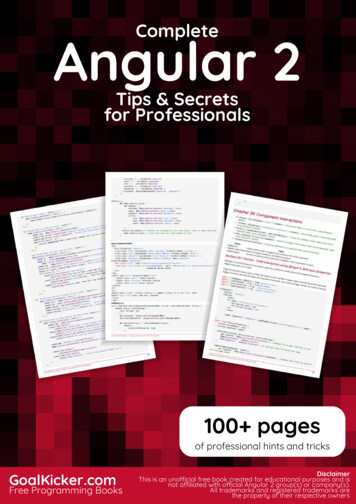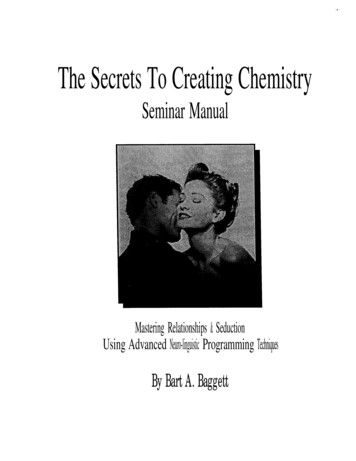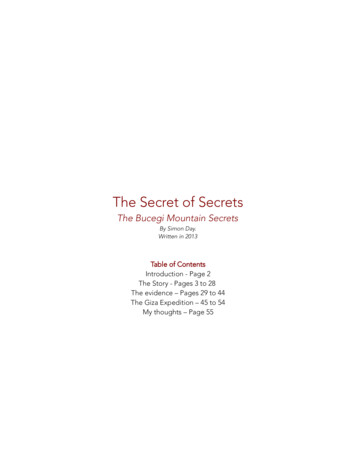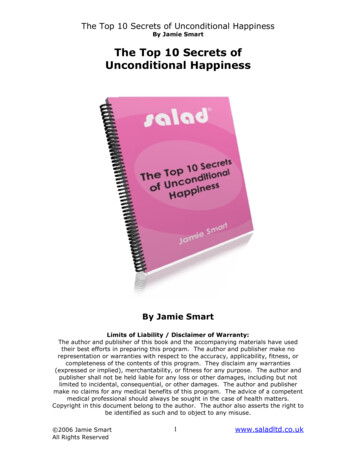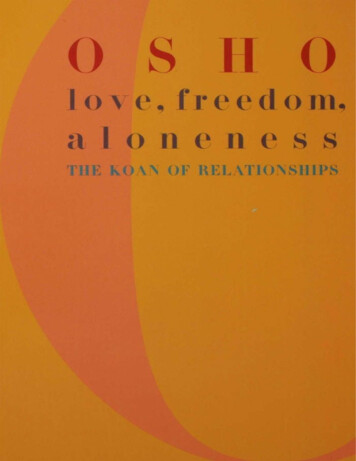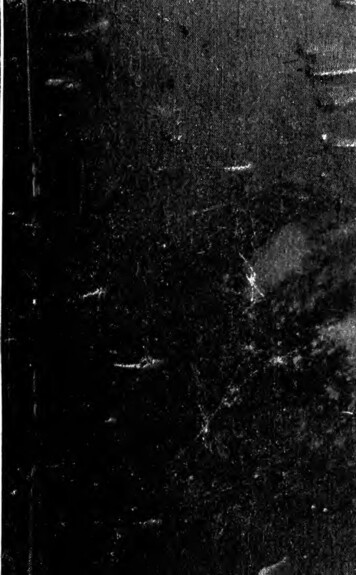
Transcription
ff :
lltrllriiln)«s*-Xvlo49 55(litllinim
/
other Works by the same Author.The Book of Enoch.Translated from Dillmann's EthiopiaText (emended and revised; with Introduction, Notes,Appendices, and Indices.8vo, i6s.The Etbiopic Version of the Hebrew Book of Jubilees.Edited fromfour Manuscripts,emended and restoredSyriac,inandcriticallyGreek and Latin Fragments ofR. H. Charles, M.A.revised,accordance with the Hebrew,thisBook, by4to, 12s. 6d.0;i;for6AT THE CLARENDON PRESSLONDON HENRY FROVVDE:OXFORD UNIVERSITY PRESS WAREHOUSE, AMEN CORNER,E.G.
THE BOOK OFTHE SECRETS OF ENOCH
on OttHENRY FROWDEOxford University Press WarehouseAmen Corner,(nmMACMILLAN &CO.,E.G.?)orft1X2FOURTH AVENUE
THE BOOKOF THESECRETS OF ENOCHTRANSLATED FROM THE SLAVONICBYW.RFADERIXR.MORFILL,M.A.RUSSIAN AND THE OTHER SLAVONIC LANGUAGESANDEDITED, WITH INTRODUCTION, NOTESANDINDICESBYR.H.CHARLES,M.A.TRINITY COLLEGE, DUBLIN, AND EXETER COLLEGE, OXFORDOxfordAT THE CLARENDON PRESS1896
O rfotSPRINTED AT THE CL A REN' DON PRESSBY BOBACE HAST, PEIXTES TO THE rxn-EEStTY1 4955ssiZZon9G
PREFACEThe BookEnoch cannotof the Secrets ofand of theinterest to students of Apocalyptic literatureiswith a view to help suchedition of thebook has been undertaken.origins of Chiistianitv.that this thefirstbe offail toIn certain respectsitItwillappeal also to specialists inSo far indeed as it does so, I have l: een ablemore than refer to the leading- scholars in thisAssyriologv.to do Kttlemydepartment, asslight,andknowledge of such subjectsveryissecondhand.allThis book has had a peculiar history. For more thanyearsithas beenance withitunknown2001save in Russia, where acquaint-goes several centuries back.Further,byitswas never known in any literature savethe Slavonic. Even in Slavonic the name was not quiteconstant, if we may trust one of the MSS. (B) for there itappears as The Secret Books of God which were shown toEnoch.' And vet the book was much read in manv circlesin the first three centuries of the Church, and has left morepresentnameit:'traces of its influence thanmanysameandliterature (see § 5),ita well-known Iiook of theisundoubtedly of muchgreater importance in respect of exegesis.formititsGreekpassed current prol ably under the general designa-tion of Enoch.tinguishedhas comefact,InOccasionallyby those who useddownin thisweitfind that itwas notfix m the older ttookto us through the EthiopicWedis-whichhave, inbook another fraomientarv survival of theliterature that once ciix?ulatedunder the name of Enoch.
Preface.viiiThat such a book had ever existed was not knownWestern Europetill1893,when awriter in ainGermanreview stated that there was a Slavonic version of theBookEthiopiaof Enoch.ByMr. Morfill's helpsoonitwas no foundation whatever forsuch a statement, and subsequent study showed that wehad recovered therein an old and valuable pseudepigraph.The next step was naturally to secure its publication, andthis was soon made possible thi-ough the kindness of thebecameclear that thereDelegates of the Press.It willbe generally understood that greatdifficulties besetsuch an undertaking, and particularly in the case of a bookwhose existence there had never been even a surmise inthe world of scholarship, and to which there was not aofunmistakable allusion in.singlealleditor in such a case has to pursue unt ravelledif,Theways, andancient literature.in his efforts to discover the literary environment, thereligious views, the date,and language ofhis author,hehas fallen once and again into errors of perception or judge-ment, he can therein but throw himself on the indulgenceof his critics.Thefii"stcomings.edition of such aThework must have manyshort-editor will be grateful for correctionsandfurther elucidations of the text.In order to appreciate the value of this book ineluci-dating contemporary and subsequent religious thought, thei-eader should consult pp. xxix-xlvii of the Introduction.In conclusion, I must expressmygratitude to Mr. Morfillfor his great kindness in undertaking the translation of theSlavonic texts, and for his unfailing courtesy and unweary-himthe Slavonic MSS.ing energy in the prosecution of the task.that Iin §amindebted for the account ofIt is toI.R. H. C.
CONTENTSPACEIntroduction§xi-xlviiShort Account of the Book (pp.I.MSS.(pp. xii-xiv).(pp. xiv-xvi).§ 4.xi, xii).§ 2.The Slavonic§ 3. The Text followed in the TranslationThe Language and Place of Writing main—part of the Book written originally in Greek at Alexandria, butsome§ 5.sections originally inHebrewin Palestine (pp. xvi, xvii).Relation of the Book to Jewish and Christian Literature.Authors and Writings influenced directly or indirectly byBookBook:ofAdamthisand Eve, Apoc. of Moses, the pseudo-Cyprian De MoniihusSina et Sion, Apoc. of Paul, St. Augustine,Sihi/Uine Oracles, Irenaeus, Orif/en, Clement of Alex., AscensionofIi aiah,JEp.ofBarnuhas,Keio Testament Tests. of the TwtlcePatriarchs (pp. xvii-xxiv). § 6. Integrity and Critical Con,Book (pp. xxiv, xxv). § 7. Date and Authorship.Hebrew sections pre-Christian the rest 1-50 A. D.dition of theOriginallyThe authorxxv,— anxxvi).§—:orthodox Hellenistic8.SomeJewof Alexandria (pp.of the author's views on Creation,Anthropology, and Ethics (pp. xxvii-xxix). § 9. The value ofthis Book in elucidating contemporary and subsequent religiousthought3.—I.Sin the cause of death.The Creationgood andevil.Saints.6.of4.TlieMan2.The Millennium.with freewill and the knowledge ofThe Seraphim.HeavensSeven5.— anTheIntercession ofearlyJewishandChristian belief (pp. xxix-xlvii).The Book of the Seceets of Enoch.Appendix.Melchizedekian FragmentTranslation and Notes.Additional Note on the PhoenixesIndexI.IndexII.Passages from the Scriptures and ancient writersNames andSubjects1-8485-9394.95-9798-100
INTRODUCTION§The BookShort Account of the Book.I.of the Secrets ofEnochhas, so far as is j etknown, been preserved only in Slavonic.convenience to take advantage of thisfact,It will suit ourandcall it shortly*the Slavonic Enoch,' in contradistinction to the older bookAs theof Enoch.latter hasthrough the Ethiopic alone,designateit ascomerecentlynowill beof the EnochielesswhenjNIy attentionediting the Ethiopicf. Prot. Theol. pp. 127-158 (1892).wasarticle that theretoMr.itfor help,ment wasarticlebyin the Jahrh.was stated inthisand in the course of a few weeks wemuch studyEnoch was,MSS.in question.to discover that Kozak's state-absolutely devoid of foundation.Secrets ofdrawnthe Ethiopic Version, I at once appliedhad before us printed copies of two of theIt did not takewerewas a Slavonic Version of the Book of Enochknown through]\IorfillfirstEnoch by anAshas onlyMSS. whichKozak on Russian Pseudepigraphic Literaturehithertoconvenient toliteratureto light through certainfound in Russia and Servia.to this factitto us in its entiretythe Ethiopic Enoch.''new fragmentThiscome downThe Bookas it soon transpired, aof thenew pseud-epigraph, and not in any sense a version of the older andwell-known Book of Enoch.less value, asweIn many respectsshall see in the sequel.it isof no
The Book of the Secrets of Efioch.xuThe Slavonic Enochin its present formwas written some-where about the beginning of the Christian era. Its authoror final editor was an Hellenistic Jew, and the place of itscomposition was Egypt.Written at such a date, and in Egypt,expected thatNewof thewas notitto beexercised a direct influence on the writersitOnTestament.the other hand,itoccasionallyexhibits striking parallelisms in diction and thought,some of the dark passages of thewithoutandbut inexplicablelatter are allits aid.Although the very knowledge that such a book ever existedwaslost forprobably twelve hundred years,itneverthelesswas much used both by Christian and heretic in the earlyThus citations appear from it, though withoutcenturies.acknowledgement, in the Book ofof Moseslypsesand Paul(400-500ItA.D.).Eve, the Apoca-a. d.),theSibyllineand the Epistle of BarnabasOracles, the Ascension of Isaiah(70-90Adam andquoted by name in the Apocalypticisportions of the Testaments of Levi, Daniel, and Naphtali(circ.1A. D.)by Clement wasItreferred toof Alexandria,phrases in theNew§ 2.The Slavonicby Origen and probablyand used by Irenaeus, and a fewTestament may be derived fromThe Slavonic Manuscripts.redaction of the text of theBook of Enoch,now for the first time translated intocome down to us mainly in two versions. Itwhichisfrom the evidence inGreekoriginal.First those inI.§The groundsEnglish, haswill be clear4 that they are translations from aThe manuscripts may be thuswhich wefind thethese two have been preserved'it.for this date of theTestaments cannot be stated here,uor yet for the assumption some pageslater that they sprang from aHebrew;[a)aoriginaLlostclassified.complete text, and ofMS.in the possessionThese I hope to give atlength in an edition of these Testa-ments.
Introduction.Khludovof Mr. A.MS.andthis is a;South Russian recension.Thebelono-s to the second half of the seventeenth century,found in a Sbornik or vohime of miscellanies containinp*isof the Saints and other religious treatises.also livestext was publishedthe HistoricalMoscotv,manytext,vol.by Mr. A. Popovand Archaeological(Moscowiii.itisletterAtheinA MS.Itunfortunately inisattempts have been made tocorrujitnotescriticaldiscoveredin the Transactions ofIt forms the basis of the presentplaces very corrupt.but whereThisSociety of the Zhiiversity of1880).supply a sounder text from other{b)xiiibyMSS.toItthepresent translation.MoscowProf. Sokolov ofPublic Library of Belg-rade in themarked by theisyear 1886.in theThisisBulgarian recension, and the orthography belongs tomiddle Bulgarian period.MS.istheprobably of the six-It contains the account of the priesthoodteenth century.ofThisaMethuselah and Nir, the birth of Melehizedek and theThoughDeluge.of Enoch,ita shortenedMSS.Belgradeadded as an Appendix.isII.ThereBookisalsoand incomplete redaction of the text of which threeknownarethis legend does not belong to this;{a) thatpreserved in the Public Library ofa Serbian redaction, which was printed by Nova-;kovic in the sixteenth volume of the literarv magazine Starine(Agram, 1884).INIanyvery interesting.cited as B.is(Jj)Itisof thereadingsof thesixteenthof thisMS.century,andareisThat in the Vienna Public Library, whichalmost identical with the preceding;{c)aMS.of theseventeenth century in the possession of Mr. E. Barsov ofMoscow.OfAandthe aboveB:MSS.of the otherI have direct acquaintance only withMSS.I have only an indirectknow-ledge through the text prepared by Prof. Sokolov, whichbased onallthe aboveMSS.isUnfortunately, however, thistext has not fully discriminated these sources.to avoid misconceptions, this text whichisAccordingly,designated as Sok,
The Book of the Secrets of Enoch.xivisto be understood as representing- all authorities otherAand B,thanOther fragments of the Book of Enoch are to found inTikhonravov's Memorials of Russian Apocryphal Literature(IlaMflTHiiKHOTpeHeHHoiiand Py pin's Me-mrrepaTypBi),pyccKoiimorials of Old Russian Literature (IlaMHTHnKn CTapnHHOii pyccKoftByjiuxepaTypLi).and citations in early Slavonicallusionslitera-we can see that these late manuscripts are only copiesmuch earlier ones, which have perished. Thus Tikhonravovture,ofcitesfrom a fourteenth centuryThe duty of theone— toMS.translator has been a comparatively simplepresent a text which would be of service toWestern students of apocryphalToliterature.philological questions have been subordinated,mySlavonic friends must not blame;forpurpose by enablingMymynot going moreRev. R. H. Charles, toand learnedly as he has done fromIn conclusion,the standpoint of Biblical apocryphal literature.must say that I am gladtocontribute toCharles.inhowever small a wayI wish also to expressmemy thanks to;Professors Sokolovformer forto thethe use of his emendated text and furnishingwith valuable notes on some obscure passageslatter for theto be ablesuch studies through the agency of Mr.and Pavlov of the University of Moscowallowingwork has nottranslation will have served itsfriend, thetreat the subject as fullyIkind interest which he has taken;in3.The Text followedmeand to thethe book.W.§alland thereforecertainly the time for such ayet come in England.endThese would be out of place on theinto linguistic matters.present occasionmethistheR.M.in the Translation.The formation of the text has been a matter of greatAs I have no knowledge of Slavonic, Mr. MorfiUdifficulty.has been so jjood as to furnishA,Band of Prof Sokolov'smetext.withliteral translationsThe number ofofvariations
KVIntroduction.which was unduly great at the outset has to some extentbeen diminished by lshouldremark,hasThisconscien-tiously refrained from all but obvious corrections of the text.and of reservesI resolved after due examination totext,theinMSS.from his translations of the SlavonicStartino- thenbothof coursebetterAandand thatreading*,Bback on the text of Sokolov.followedisare corrupt, IOccasionally Iwhendoesithaveitfallenhave beenobliged to follow one reading to the rejection of the others,incaseswhereallthe readings wereIn only two or threeimprobable.equally probableorhave I emendedpassag-esthe text, and that in the case of numbers, whichquently corrupted in tradition through jNISS.Inare frecasesallthe rejected variants are given in the critical notes below,eventtheinso that,reader canmaterials, thetheofdiscovery ofrevisethe textin the process will reverse, no doubt,freshcriticalfor himself,manyandof the editor'sjudgements.As regards theformerisvery corrupt,it isof the original than B.work— beingabbreviationmerits ofrelativeAand B, though thenevertheless a truer representativeBisreally a short resume of theabout half the length of A.In the process ofeditor or scribe rejected initssome instancesand in others recast entire sections with capricious rearrange-ments of theoccasionallv inonFor an example of the method pursuedtext.Bthe reader can consult sin xx. 3 thereisa mention of the tenth heaven, and in xxi-xxii. 3 a description of the eig'hth, ninth and tenth heavens, though the restof the work directly speaks of and indirectly implies onlyseven heavens.The readerBwill findomitsmanyallreference to this addition in A.other like additions which have as
Book ofTliexvia rule been relegated tothe Secrets of Enoch.tlie criticalnotes or g-iven in the textin square brackets.TheIthe head of the chapters are given by A.titles athave enclosed them in square brackets, as they have noTheyclaim to antiquity.are not given in Sokolov's text,Anor are they found in B.fewdo appear in B, buttitleswith one exception these consist merely oi Entry ofthe first heaven, Eniri/ ofEntry of EtiochAndstancespart of this book was written for theThisshown by such statements,isgave him a nameI(i. e.Adam's nameThis fancy wasderivationimpossibleisfirsti.e.elaborated in Greek, as thisSemitic languages.inHebrew and ding tochronologies he was 6 .JosephusLXX chronology.LXX text of Deut.true, adopts the4 the writer reproduces the1.the four sub-and the South.'165 years old when he begat INIethuselah.also (Ant.13,avaroXri, bvats, apKTos,the writer follows the chronology of thethetimehere derived from the initial letters of theisGreek names of the four quarters,fjL (rriiJi[3pia.first(1) as xxx.Adam) fromEast, the West, the North,the: into the seventh heaven.The mainin Greek.'into the second heaven, &c., Sec,The Language and Place of Writing.§ 4.I.EnochE)iocJi into against the Hebrew. (4) The writer frequently lasesEcclesiasticus, and often reproduces it almost word for wordxxxii.cf. xliii.Ecclus.33,i.2—Ecclus.also:Ecclus. xxxix. 25li.:i,xxiii. 73;x. 20, 22,— Ecclus.also Ixv. 2vii.32—Ecclus.;24ii.:4also xlvii.:Sofaraswe canEcclesiasticusSomeHebrew.it(5) Ixv.vii.17,418.was the Greek Versions ofand Wisdom that our author used.sections(Seejudge,also Ixi. 2xvii. 3, 5*seems to be derived from the Book of Wisdom5of thisp. xxiv.)book were written originally in
Introduction.This book2.Alexandria.From(i)commoninwas written in Egypt, and probablyThisdeducibleisthe .inThusexistent was created from the non-existent, xxiv. 2cf.Philoj(le Just'if.7of the world, xxiii. 5:Ins 3;Wisdom:cf.2Ixv. 6:so:Finally swearingde Spec. Leg.xxv.;i:had seven naturesisxxxi.2Mancouldcf.Philo,:no resurrection of the body,Book of Wisdom and Philo taught.reprobated by both, xlix. 1.2:isthe h G'lganti-;Philo, de Miindi Op. 40.Therethei.ii.22i.manthe angels in heaven,seeQuaest. iu Gen. xxxii.1.Again,viii. 19, 20.or powers, xxx. 9originallyPhilo, de Somno,cf.inwere created before the foundationsouls;facts,writings which were Hellenisticcirculatedorthe following-speculationsandPhilofromincf.Philo,The whole Messianic teaching of the(2)Old Testament does not find a single echoin thework ofthisHellenized Israelite of Egypt, although he shows familiaritywith almost every book of the Old Testament.Phoenixes and Chalkydries,heads of crocodilesimagination.(4)— areThexii(3)—monstrous serpentsnaturalThewitli theproducts of the Egyptiansyncretistic character of the account ofthe creation, xxv-xxvi, which undoubtedly betrays Egyptianelements.Wefor ashould observe further that the arguments thatGreek original tendwas written in Egypt,to support theespeciallyconjunction with the date of§ 5.itsmakeview that the bookwhen wetakethemincomposition.Relation of the Book to Jewish andCheistian Liter atuee.The1200discoveries regarding the planets, &c.,A.D.) in hisshown onBookp. 37,of Enoch.Chronography assignswhich Joelto Seth are. as(circ.we havemost probably derived ultimately from thisInlikemanner the statements regardingb
The Book ofxviiithe Secrets of Enoch.tHe sabbath and the duration of the world, which according toCedreniisBook1050(circ.of Jubileesai"ea.d.)were drawn from Josephus and thelikewise to be assigned to this book;fornothing of this nature appears either in Josephus or theBookCedrenus,of Jubilees.we should remember,dependent on Syncellus, and Syncellusislargelyvery often wrong inishis references in the case of Apocalyptic literature (see xxxiii.I,It2 notes).regardingallwas alreadyisnatural that these late writers should errfrom this book, inasmuchfacts derivedas itknowledge many centuries before theirlost to allday.Let us now pass over these intervening centuries toa timewhenbookthisw as still inNowsome measure known.Book of Adam and Eve of the fifth century wepassages drawn from our l)ook which are quotationsfindmore thanBut thein thewicked Satan .so that I hurledfrom xxix.(i.e.Thusin words.4,Satan,5' at naught,weviI.make.entertained an impossible ideahis throne higher than the clouds overI hurledhim from theand Eve,I. viii:AgainWhen:'ImadeMyin theThis comes fromhim the heavens open that he shouldforperceive the angels singing the song of triumph.'on xxxi. 2view in Philo andfor similarin I. xiv of the formerbook the wordsabode of light thou longestI. xi':That gardeninfor,any darkness continually inwe haveSt.':whereinSee notesEphrem.AgainThe garden, into theisno darkness,' andwhich was no darkness,' are probablyderived from Slav. En. xxxi. 2NextAndAdampower.Book ofwe dwelt in the garden . we sawheights.'his angels that sang praises in heaven.'xxxi. 2':and sought the Godhead,the earth, and should be equal in rank to'readin sensehim down from heaven.' This is drawnOne of these in the ranks of the Archangelsxxxi. 4)cf.that he shouldmesetintwo':Andtherewas light withoutParadise.'in the Apocalypse ofMoses(ed.Tischend. 1866),p. 19,a further development of a statement that appears inour text regarding the sun:see xiv.2-4(notes).
Introduction.xixIn the anonymous writing- De montibus Sb/aetweSlon 4,have most probably another trace of the influence of our textIn this treatise the derivation of Adam'sin this century.name from theof the four quarters of the earthinitialsisThis derivation appears probably for thegiven at length.time in literature in xxx. 13 (see note).In the fourth century there are undoubted indications offirstThus theuse in the Apocalypse of Paul (ed. Tischend. 1866).statement, p. 64,ovro's Icftiv 6 TrapciSetcro?,wiraniieyedi] (sic) copaiov, kvbeyond thethe tree ofHecomes intopiCi]SavTovfxaTU,and.bevbpov.kiraveTraveTO to irvevixa to ayiov ispossibility of question a Christian adaptation ofthe Slavonic Enochis) v6aitslife,viii.3':Andin the midst (of Paradisewhich Godin that place, onAgain the words,Paradise.' i ']px. T0.peovTes.64, eKr?;?opvy-els Teaa-apavbiop, p. pi 6p.evovp. 52, TioTap.o\ Tea-n-apesp.whenrests,yd\a koI/xe'At kciI(KaLov Kal dlvov, are almost verbal reproductions of our text,viii.5':Fromroot in the garden thereitsstreams which pour honey and milk,of hell in this Apocalypse,TioTaixos (pp. y, 58),therei.e.ovkrjvwe may comparewas no light there.and acharacteristic featuresand Kd p(osx.of our textifiery river6 irvpivd 'And:goes forth.'peculiar speculation of St. Augustine in theThefourand wine, and areoilWith twoseparated in four directions.'go forthBeCiv.xxii. 30.5 seems to be derived ultimately from xxxiii. 2 (seenotes).Compare withtamen septimaeritxxxiii. 2 especially thesabbatum nostrum cuiuswords:finis'Haecnoneritvespera, sed dominions dies velut odavus aeternus.'In the early part of the third and in the second centurythereisthe following evidence of the existence of our text.Thus in theSibylline Oracles,bevopih'019 T TTapacTx ov,and 88are too closely parallel toto the orphan, theii.1.5—opffyaviKoXs X'lP' '- 75widow [and thei,'Stretch out your handsstranger,out your hands to the poor,' to be accidental.b a '"x P* TievqTevovcriv ope ovcri]vli.''"'Bom.].Stretch
XXBook ofTJiethe Secrets of Enoch.In Irenaeiis contra Haer.28.v.bpeeulation in our text, xxxiii.i,2,lastSee text, xxxiii.thewesabbathfirst,000 yearsiaftercreation.2 (notes).i,Ongen (according to Methodiusxxi. p. 59)days so the worldsix6,oco years, and that there would beof rest corresponding" toInthe Jewishreproduced to the effectthat as the work of creation lastedwouldwe have3;Lommatzschseefind a reference to this speculation:edition,yjiXio vyap(Tutv TTepiopiCoiJiivcov els p-iav T][xepai h' d p6aX.p.ois Oeov, a-no TrjsTov Koafiov yeviaecosTi]vKaTa-jrava-eois p xP'- p- XP'-4)daK0V(napL6p.rjTLKi]vheivoi,efr]p.'2v, cosol irepXavp-irepaiovvTai.i]p.ipaiE aKL TXLXLO(TTdv apa eros (paalu a-o 'Abap. els bevpo avvreiveLV'yaprfik bopaOLerete7TTaKtcr tA.to(rr(5roiKpicTivacpL eaOaiAVhether this passage argues a direct knowledge of( acTiv.the Slavonic EnochisThere can be no doubt,doubtful.however, with regard to the direct reference in the dei.3.2'Namita referturet in eo libelloPrimo omnium:.fecitomnia.scribuntur.'.Now.SedEnoch xxi V—XXXClement, Strom,cf. xviii.unuscumEnochconscripsit,est Deus, quinihil esset prius libro his similiade-isno account of the creationishere referring to the Slav.xlvii. 3, 4.;The fragmentOrigenqui:et insince therein the Ethiopie Enoch,Hermasquerncrede, quiaomnia creavit atque composuitesse.Princi]).of the Apocalypse of Zephaniah preserved inv. 11. 77, is likewise tobe traced to our text(notes).During the years 50-100a.d. our text seems not to beThus in thewithout witness in the literature of that period.Ascension of Isaiah,of the sixth heaven:viii.'16,weOmniumread with regard to the angelsuna specieset gloria aequalis,'whereas the difference between the angeliclower heavensrepeatedly pointed out.isorders in theNowin our text,xix. I, it is said of theseven bands of angels present in thesixth heaven thatis'thereno difference in their countenances,or their manner, or the style of their clothing.'
Introduction.In 4 Ezrasol'[vi.are found inWith71] the words 'ut facies eorum luceant sicuti.5'Their faces shone like the sun.'the Apocalypse of Barnch,Paradis\im)Adamo priusquamTO.3Ostendi earn'compare xxxi.(i.e.2," a-vvereX a-ev (vrl Aeyei to'tovto Ae'yei ort iv aKL(r\i\ioLS T (nv avvTeXeaarjixcpais."Kvptosiv.pecearet,'In the Epistle of Barnahas xv. 4e XXI(JVvnavTa.yap1)i)iiipa Trap" avT(o (nip.aivetX'Ata Tr],we have anexposition of the rather confused words in ourtext, xxxii. 2—In xv. 5-7, however, the writer ofxxxiii.thisEpistle does not develop log-icallj the thought with regardto the seventhdayGodseventh day on whichfor the;restedfrom His works should in accordance with the same principleof interpretation as in xv. 4 have been taken as a symbol ofa thousand years of rest,[ef/ol] heKTO.,7]p.epaseighth day :phrase 'thepeculiarakXaoyborjsiviTeTroCrjxa,o ((ttlvttoli](tu ,cpEnochverse 5, the EthiopicTheaAAouKocrp-ovmaytliein this Epistle, xviii.'I7/i,iravTa apx jvto.Ita.p)(r].maynext chapter, iuquoted asisthat Barnabas does not quotepoint to his discrimination betweenthe two books of Enoch to the detriment of the(pcoTos KOLhow-vvv cra fiaTato.(Ixxxix. 6, 66)fact, therefore,our text as Scrij tureovKaraTiaijaasnot be amiss here to point out that inScripture.8,shows his return to our text by his use ofever, this writertheIn xv.the millennium.i.e.the words obol bvolatter.Again.re tovelcrlv17TOV aKOTovs arc derived from our text, xxx. 15.showed him the two ways, the light and the darkness.'Though the Two Wayson xxx.(see note15),are often described in early literatureonh' in Barnabas are they described inthe same terms as in our text.In thedictionisNewTestament the similarity of thought andsufficiently large to establish a close connexion, ifWithnot a literary dependence.the peacemakers,' comparepeace.'WithSt.Matt.neither by the heaven.lii.v.St.Matt.11,' Blessed is he34, S 37,.''v. 9,whoBlessed areestablishesSwear not atnor by the earth.allnor by
The Book ofxxiiJerusalem,compare.but.xlix. i, 'I willGod made. .by a word,WithSt.Matt.no truthisxlii.20,vii.':Nay,nay,'neithersing-le oath,men,inthem swearlet(See notes.)By theiryefruitsknowshallthem,'their works thosewho have wroughtThe words Be of goodcheer, be not afraid,''By14,Yea, yeaby any other creature whichearth, norIf therebe,not swear by ayea, yea, or nay, nay.'St.comparethemyour speechletby heaven, nor bythe Secrets of Enoch.are known.''Matt. xiv. 27, are of frequent occurrence in our text,Withxxi. 3, &c.XX. 2;kingdom preparedcompareix.you from the foundation of the world,'forParadise)(i.e.OEnoch,LukeSt.vi. " ixrjhev a-ni\Tii(ovTis,Kextmanythe world to comemen, good.xlii. 7,'Ex-myNext with Johnxiv. 2,'Inmansions,' comjjareIxi. 2,'For inpecting nothing in returnFather's house arecomparepre-ispared for the righteous . as an eternal inheritance.'with;Matt. xxv. 34, 'Inherit theSt.'This placei,8i.'there arefor the g*ood, evil formany mansions pre mredthe evil.' With Acts xiv.for15,Ye should turn from these vain things unto the living God,who made the heaven and the earth,' compare ii. 2, Do notworship vain gods who did not make heaven and earth.' In''the Pauline Epistles there are several parallels in thoughtandWithdiction.Col.or powers/ compare xx.powershisis':with Eph.iv.For other Paulinexi. 3,''Speak ye truth each one with12, 'Blessedwith our text see pp. xxxix-xli.The worlds have been framed by the wordisseen hath not beenwhich do appear,' compare xxv.visible things shouldtheeand what.come outwhat thingsvisible thingsparallels ofwhomhe inisspeak the truth to his neighbour.'parallelsof God, so that whatw'ill tellprincijialitiesLordships and principalities andxlii.maythe truth that he'25,compareneighbovrr,'With Heb.i,'Dominions or16,i.i,'Imade outcommandedof things.of invisible, and xxiv.I createdfrom thethat2,'Ifrom the non-existent,invisible.'Hebrews with our text.For two othersee p. xli.With Rev.
Introduction.i.XXUl'His countenance was as the sun shineth,' compare1 6,'Their faces shone like the sun':withix.xlii. i,Those who keep the keys and are the guardians of theWith Rev.of hell.'iv. 6,A'glassygreat sea greater than the earthyheaven,mayhowever,above the firmament' (Gen.the angelcomparebe nois.swareIxv. 7,year,' &c.':.i.'3,'Afirstthe waters which wereWith Rev.7).iii.g-atesThis sea in thesea.'merelybecomparesea,'5,'There wasi,given to him the key of the pit of the abyss,' compare'i.x. 5, 6,'Andthat there shall be time no lono-er/Then the timesxxxiii. 2,'shall perish,and thereshallLet there be . a time when thereno computation and no end;neither3'ears,nor months,' &c.Finally, in the Apocalj'ptic portions of the Testaments of theXIIPatriarchs, which were written probably about the begin-ning of the Christian era wefind our text quoted directly orIn Levi 3 we have an account ofthe Angels imprisoned in the second heaven Iv avT(a elal -ndvTaimplied in several instances.:TO,TTvevfJLaTatu v eTTaycoyS)vmust be rendered In'whoare keptitareallThisav6}X(iiv.the spirits of the lawless onesbound unto (the daystatement compare our textrdvkKhiK-qaLv66?vii.Withof) vengeance.'i,the second heaven are described aswhere thethisfallen angels inthe prisoners suspended,'reserved for (and) awaiting the eternal judgement.'Again, inthe same chapter of Levi, there are said to be armies in thethird heaven,ol v Tols TTvevpaa-LTayQivmeis rjixepav KpCaectiS, TroLrja-ai (KbUi](rLVtt/s irXdvjjs.Withthese compare the angelsof punishment in the third heaven in x.from Enoch in Test. Dan. 5yaplyv(X)V2ararasii /3ty3A.a)is'EypTiyopoi)Lord.'who withxviii. 3,Kara*Av-oti,6 dp\(av vp.Qveanv'These are the Grigori6(i.e.their prince Satanail rejected the holyIn the Test. Naptli. 4 the authority of Enochclaimed by the writer as follows'Ei;(«);(,The statementtwj; TTv vfidToov r?]? -nXdmi .'Ez'wx tov StKatou,drawn from3.: AviyvcovkvypacpfjisayiaoTi Kai ye kol VjueTs d7ro(rTi](r (r6e dirb Kvpiov, TTop(v6p. ioLirairav 7tOV)]pCavk6vC)V, Ka\7rot7/crereKard ndcrav dvopLiav
The Book of the Secrets of Enoch.xxivKoi iird et. vfxiv Kvpios al\ixak(acriav'2ioh6fX(jiv.ThisKvpio9 TidvTas vjxdi.Acdo-?/times of xxxiv.2,3,*And.ew? av ava-a l
TheLanguageandPlaceofWriting—main part of the Book written originallyin Greek at Alexandria,but some


